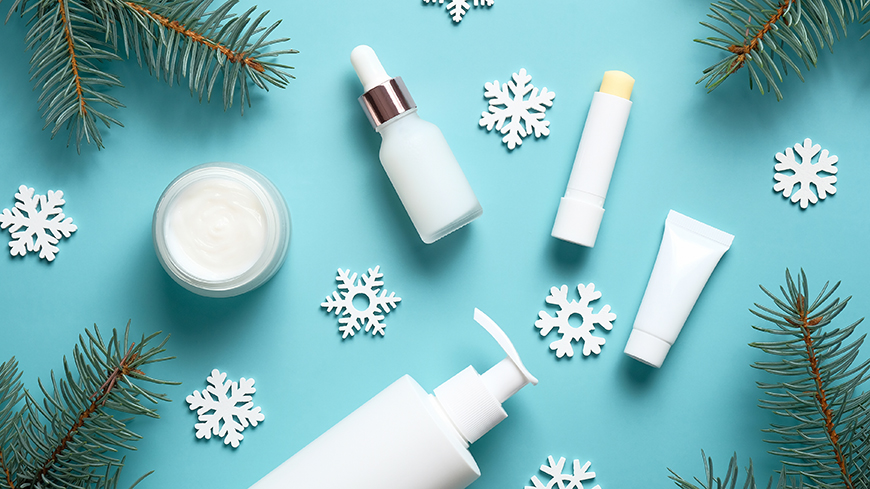Winterizing your Skin: Keeping your Skin Healthy During the Winter Months
8 TIPS FOR WINTERIZING YOUR SKIN
Use a Humidifier

Humidifiers help to protect your skin while indoors. Ensuring that it is kept at a level of 40-60 percent will help to keep moisture in the air on dry winter days. Dr. Dendy Engelmen is a certified dermatologist in New York City who highly recommends the Canopy Humidifier (pictured above). It only releases pure, hydrated air, due to its high-tech evaporative system. It uses a technology that stops mould and bacteria from growing, ensuring that only the most filtered air reaches your skin.
Skincare Note: If the temperature of the water you are using is too hot, your skin will turn red.
Lower the Temperature of Showers and Hand Washing
During the winter, it’s very tempting to take hot showers to keep warm. However, hot water can remove your skin’s natural oils, causing it to dry out, crack and flake. Dr. Enggelmen recommends that to avoid this, try using cooler water temperatures to maintain the moisture in your skin. If your hands are dry, exposing your hands to hot water can lead to an eczema flare-up. Using cooler temperatures of water can be gentler on your hands.
Use Lip Balm
During the winter, your lips can get dry more often because they are made from thinner skin and are more exposed to cold weather. The skin on your lips is made from 5 to 6 cellular layers, while the rest of your body’s skin has about 16. Compared to the rest of your body, the skin on your lips doesn’t have oil glands made to keep your skin moisturized. Aquaphor is perfect for extremely dry lips due to its acne-eliminating medication that decreases the size of the lip’s oil glands.
Moisturize your Skin when Damp
The American Academy of Dermatology Association (AAD) recommends doing so after a shower, bath or washing your face or hands. This traps the moisture in your skin, moisturizing it more effectively. Try to do this within minutes after exposure to water to lock in the moisture.
Drink a lot of Water
Because of the cold temperatures, a lot of people forget to continue to drink water. During the winter, it is harder for your skin to absorb moisture and water keeps your skin hydrated.
Consider Reevaluating Your Skincare Products
In an article by Everyday Health, Dr. Marie Hayag, MD dermatologist, recommends that if you are finding that your skin is constantly dry, try eliminating products with alpha-hydroxy acids (AHAs) and retinoids because they can worsen dryness on the face. Additionally, the AAD suggests that people should avoid skincare products carrying alcohol and fragrances for the skin to continue to retain its natural oils.
Replace Lotions with Creams and Ointments
The AAD states that ointments and creams are more moisturizing and less irritating than lotions. Here are some helpful ingredients to look for when buying an ointment/ cream:
- Jojoba oil
- Dimethicone
- Glycerin
- Hyaluronic acid
- Lactic acid
- Lanolin
Wear Sunscreen– Even on Dark Winter Days
The Skin Cancer Foundation notes that on sunny winter days, the snow reflects the Sun’s rays. In addition to the sun’s rays hitting you from above, they have the ability to bounce off the snow on the ground, doubling your UV exposure. Even if it seems cloudy in the winter, clouds do not provide protection from the Sun. 80 percent of UV rays go right through the clouds. Whenever you are outside skiing, or playing outside in the snow, it’s important to remember to always wear sunscreen. The AAD suggests that using sunscreen with SPF 30+ or higher will keep you protected from the Sun at all times.
Skincare Note: Some products are labelled “unscented” which can be confused with “fragrance-free” products. When shopping for fragrance-free products, ensure that you are not buying “unscented” products as they often still contain bad chemicals for your skin that try to hide the odours of the other ingredients.
Wear Sunscreen– Even on Dark Winter Days
The Skin Cancer Foundation notes that on sunny winter days, the snow reflects the Sun’s rays. In addition to the sun’s rays hitting you from above, they have the ability to bounce off the snow on the ground, doubling your UV exposure. Even if it seems cloudy in the winter, clouds do not provide protection from the Sun. 80 percent of UV rays go right through the clouds. Whenever you are outside skiing, or playing outside in the snow, it’s important to remember to always wear sunscreen. The AAD suggests that using sunscreen with SPF 30+ or higher will keep you protected from the Sun at all times.
Sources
https://www.sephora.com/ca/en/product/supergoop-unseen-sunscreen-P458907
https://www.nytimes.com/wirecutter/reviews/best-face-sunscreens/
https://www.everydayhealth.com/skin-and-beauty/top-tips-for-healthy-winter-skin.aspx
https://www.aad.org/public/everyday-care/skin-care-basics/dry/dermatologists-tips-relieve-dry-skin
https://www.instyle.com/beauty/skin/winter-skin-care-tips
https://www.nordstrom.com/s/canopy-humidifier-starter-set/6450204
https://nymag.com/strategist/article/best-moisturizers-for-dry-skin.html
https://www.allure.com/gallery/best-alpha-hydroxy-acid-products
https://www.newbeauty.com/fragrance-free-skincare-products/
https://www.amazon.ca/Aquaphor-Healing-Ointment-1-75-Ounce/dp/B00TUUA6YG
